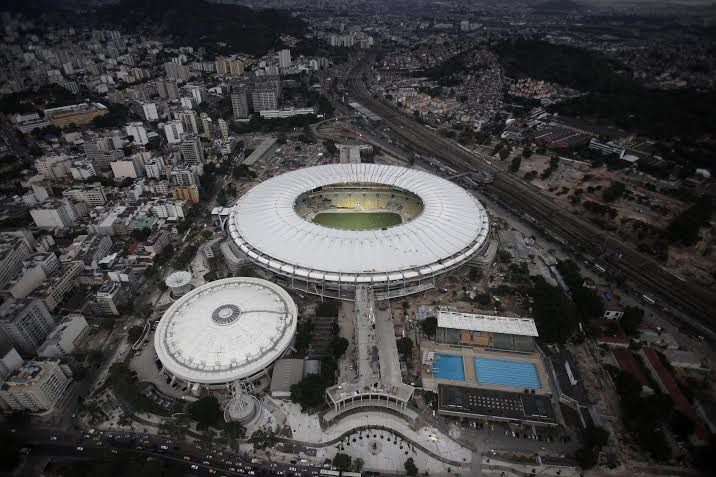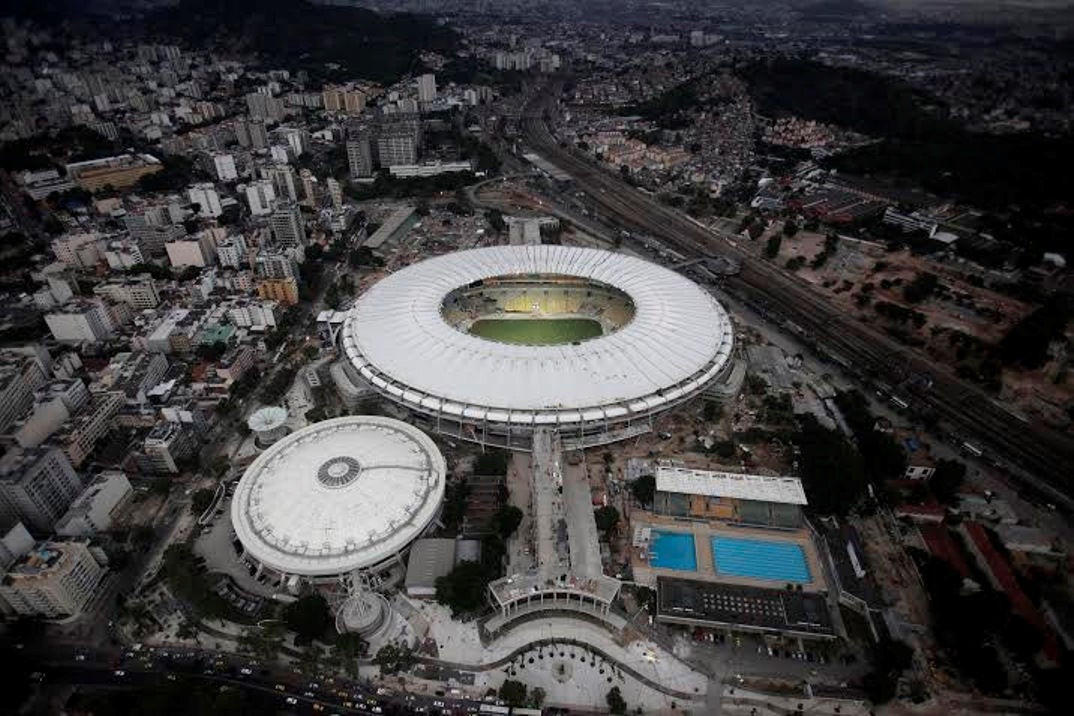A time to unite: 2014 FIFA World Cup Brazil

Nearly four years ago, I was sitting at a snack bar like Norm Peterson of the 1980’s hit variety show “Cheers.” I was at a water park in Orange Beach, Ala., and, instead of beer, I was drinking sweet tea. I was 17 and there for a church camp which was inconveniently planned during the week of the World Cup Final.
I spent the better half of the afternoon watching Spain face the Netherlands as both countries vied to win their first World Cup. Everyone in my church group took turns visiting me at the bar, asking what was so important about this soccer game that I’d sit by myself and watch it on a small standard definition TV. I mean, there was a lazy river just 15 feet away, they reasoned. Why didn’t I want to do what everyone else was doing?
By the end of the game I found my self yelling, “Do you not understand how important this is?”
They laughed, but in truth, I was “doing what everyone else was doing.”
In less than 50 days, more humans will unite in watching the World Cup than any other single event in history. Short of eating and breathing, this many people have never done the same thing at the same time across the globe.
FIFA estimated that 3.2 billion people watched the World Cup in some capacity four years ago in South Africa, with an estimated 1 billion having tuned in for the final. For comparison, there are only 2.18 billion Christians across the globe and 1.8 Muslims. In the past four years, not only has technology grown, but the world’s population has, too. All eyes will be on Brazil, and viewership is only going to increase.
Thinking back, I should have responded to my church friends, “Imagine, if there was a global football competition, and everyone on the planet cares about what happens as much as the SEC.”
Picture the Olympics, but with a sport people cared about. We would be going crazy over the American team. It would be a month long break to appreciate football and each others’ cultures. Surely, The Alabama contingent of the fan base would manage to surprise everyone and set blaze to Brazilian rainforest if we lost.
However, this is exactly what the World Cup is. Countries even set aside civil wars to watch their teams play.
Obviously, the first priority in the tournament is how the United States will fare. The U.S. is in Group G with Germany, Ghana and Portugal. All teams start out in a four-team group. The top two advance to the round of 16; Germany will be one of them. This means that we are playing for a spot against Portugal and Ghana. Ghana eliminated us in the past two World Cups, and Portugal has Cristiano Ronaldo.
Think of Ronaldo as LeBron James. He has a group of fans who love him, and an equally passionate group of fans who hate him. He’s the second best player in the world behind Lionel Messi, the same way that LeBron will always be second to Jordan. He’s freakishly athletic, but like must of us, odds are you’ll hate him once the girls start ogling over him and he starts showing off.
If we advance, it will be off of goal differential (the ratio of goals scored to goals conceded). The most realistic scenario that will see us advance is if we beat Ghana, lose to Germany, and tie Portugal. This would leave the U.S. with four points. That could be enough if the goal differential is better than Portugal’s.
Beating Ghana is possible but daunting, given our history with them. That will be the game for the U.S. to break out and play. Against Portugal and Germany defense will be key. If the Portugal game opens up, Ronaldo will run loose, and no one on the U.S. roster is capable of stopping him. The U.S’ best chance to stop him at that point would be to suit up Jadaveon Clowney and give him one shot at taking him out. As fantastic as that would be, Jurgen Klinsman will leave Clowney out of the squad.
On top of having a highly competitive group, the U.S. also has the worst travel schedule of any team. The team will be forced to travel the most and begin World Cup play out in Menaus, which is in the middle of the rainforest. Menaus games will have high temperatures reaching into the upper 80’s with outrageous humidity levels.
The odds are against the U.S. advancing. Even Las Vegas isn’t patriotic enough to bet on the team making it out of the group. So, as fans watching the game, it’s important to know the rest of the teams in the tournament. Although soccer’s a game where anyone can win on a given day, the favorites generally perform on the sport’s biggest stage.
Group A has Brazil, Cameroon, Croatia and Mexico. Brazil is the host country and title favorite. The young crop of Brazilian talent is exciting and they’ve proven they can play in Europe. With the return of Luis Aragones as manager, they will produce the most free-flowing style of play. Barcelona player, Neymar will draw all the attention, but Brazil will succeed because of their back line. Dani Alves, Thiago Silva, David Luis and Marcelo make up arguably the best back line in the world.
Group B is referred to as “the group of death.” It has the Netherlands, Spain, Chili and Australia. First place in Group B is critical because second has to play Brazil in the round of 16. The Netherlands and Spain are returning finalists, and Chili is a dark horse that a lot of people think could pull an upset. However, It seems that every dark horse that becomes a trendy pick always fails to make an impact. This happened with Colombia in 1994, Portugal in 2002 and Ivory Coast in 2006.
Spain is the reigning world champion team and two-time reigning European Champions. This recent run of championships is the best dynasty in international soccer history. They don’t have a star that shines above the rest. They are a well put together squad that has no glaring weaknesses and performs well as a unit. If they have one poor performance, everyone will overreact. Spain will do well if Diego Costa can mesh with the team after only “being Spanish” for a couple of months. Costa was born in Brazilian, but just announced he would play for Spain this year.
Group C and Group E are not nearly as strong, and while these groups will be full of their own drama, none of the teams in these pools have an expected title challenger. Group D has England and Italy. The Italians are a lot like the NBA’s Brooklyn Nets. They’re aging stars and they’ll surprise people by contending despite drinking prune juice on the side lines.
Roy Hodgson’s England are similar to Jerry Jones’ Dallas Cowboys. None of their fans understand why they don’t succeed, but everyone else does. The British media is as much to blame as the team for their lack of success in past tournaments. England last won it all in 1966. The country is desperate to win again considering they invented the sport, but with the squad they have now, I’ll predict they won’t win again until the Browns win a Super Bowl or the next Halley’s comet. Take your pick.
Group F is another weak group with the exception of having my own favorite to win it: Lionel Messi’s Argentina. Messi is the best player in the world and the stage is set for him to shine this tournament. I’ve tried to think of something negative to say about Messi, but I can’t. In between scoring hat tricks for Barcelona on a weekly basis he travels across the globe donating his time and money to a wide number of causes. He doesn’t dive and doesn’t crave the spot light. He had a hard time recovering from injury this season because Barcelona’s medical staff couldn’t keep him from sneaking onto the field and playing.
Argentina will cruise through the group and be well prepared for the knockout stages. Argentina will only win if they can outscore other teams. They have incredibly talented attacking options, but a center back pairing of Demichelis and Mascherano will struggle against counter attacks and fast opposing forwards.
The final group in the tournament is Group H. Belgium is the favorite to advance. They’re another dark horse team that people have predicted to contend for the title, but I think that’s unlikely. The people who pick Belgium to win it all are the same ones who thought Wichita State would win the NCAA tournament. Belgium, like Chili, have plenty of quality players, but teams without histories inexplicably seem to not win. There have been 19 World Cups and only eight countries have won. The World Cup champion’s group is a truly elite group. Two of these eight countries, England and Uruguay haven’t won in over 50 years.
Ideally, I think a final four of Argentina, Spain, Germany and Brazil would create the best final. No one knows what will happen in the knockout stages, but the world can’t wait to find out.

